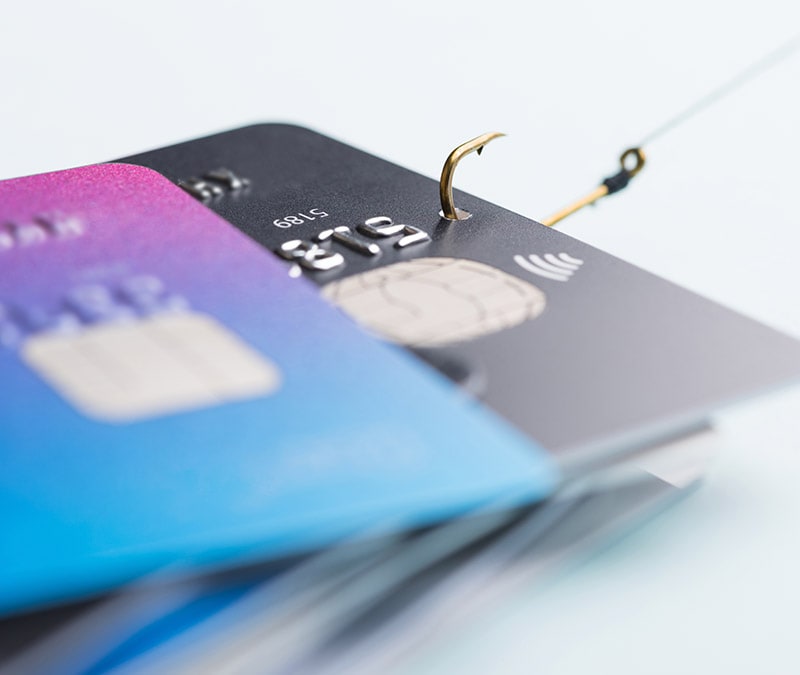7 Black Friday scams + how to avoid them
Earlier this year, the Federal Trade Commission listed online shopping scams as the second most common type of fraud in the United States. If you’re shopping online during the holidays, keep an eye out for Black Friday scams and remember that security software like Norton 360 with LifeLock Select can make browsing and shopping safer and help protect you from identity theft.

The holiday season is right around the corner. Not only is this a wonderful time for seeing family and friends, but it’s also a great time for savings, specifically on Black Friday.
Black Friday draws millions of holiday shoppers seeking to score deals, compete for hot products, and cross names off their shopping lists. In 2023, American shoppers spent more than $9.5 billion on Black Friday alone.
Regrettably, this flurry of shopping activity also attracts scammers looking to cash in, and the trends in consumer fraud are not encouraging. According to the FTC, consumers lost more than $10 billion to fraud in 2023, a 14% rise over the previous year.
In fact, one study found that attempted fraud in the U.S. during the holidays was 127% higher than at any other point in the year. Scammers can easily take advantage of the season to make off with your gifts, credit card information, or identity.
To ensure you can protect yourself from online shopping scams and make the most of all the great holiday deals, we’ve gathered seven common Black Friday scams to be aware of this year:
- Non-delivery scam
- Gift card scam
- Fake charity scam
- Fake order scam
- Fake website scam
- Fake delivery scam
- Account verification scam
Before you reach into your wallet this holiday season, follow this guide to learn more about Black Friday scams, protection tips, and what to do if you become a victim.
1. Non-delivery scam
You’re searching online and come across the perfect gift at a good price. You go to the site, put the item in your cart, and click “Buy.” But then, you don’t get a tracking number, the package never arrives, and the seller disappears. You’re experiencing what the FBI calls a non-delivery scam.
You can avoid this by sticking to reputable retailers. If you’re shopping with a new-to-you merchant, do your due diligence. Check for a physical address, a customer service phone number, and a professional-looking site. Warning signs of malicious websites include poor spelling, odd design, and slow loading times. Only buy from secure sites with SSL encryption—look for URLs starting with HTTPS (rather than HTTP).
What to do if you fall for a non-delivery scam
Document your unsuccessful attempts to contact the seller, collect screenshots or other evidence of the problems, and ask your credit card company to reverse the charges due to fraud. If you’ve been the victim of a PayPal scam, an alternative is to open a PayPal dispute. Consider asking your credit card issuer to deactivate your old card and issue you a new one.
2. Gift card scam
You plan to use your favorite credit card to make your Black Friday or Cyber Monday purchases, but a seller asks you to pay with a gift card. This may happen on auction sites and should raise big red flags. Cybercriminals often use gift cards because it’s an easy way for them to steal money from you.
Instead, use a credit card for your online holiday shopping. By federal law, your liability for fraudulent credit card purchases gets capped at $50, and virtually all card issuers offer $0 liability. Treat gift cards like cash, never give out your gift card number or PIN, and use them only with the issuing merchant. For example, use an IKEA gift card only at an IKEA store or IKEA.com. Use general gift cards, such as a Mastercard or Visa gift card, only at trusted retailers.
What to do if you fall for a gift card scam
Contact the gift card issuer immediately to let them know somebody used your gift card in a scam. If you act quickly, they may refund any money left on the gift card. Each major retailer has their own way to report gift card scams.
3. Fake charity scam
Scammers may take advantage of the holiday spirit by using heartwarming stories to get donations for fake charities. These Black Friday scammers know that charitable donations as holiday gifts have become especially popular in recent years.
To avoid this, never make an impulse donation in response to an ad or plea on social media. Take time to research charities using resources that track and rate nonprofits.
What to do if you fall for a fake charity scam
If a fake charity scammed you, report them. The FBI recommends contacting your state consumer protection division, the FBI’s Internet Crime Complaint Center (IC3), and the Federal Trade Commission. You probably won’t get your money back, but you may help law enforcement catch the scammer.
4. Fake order scam
Criminals may use Black Friday shopping to put a holiday twist on phishing scams. In these Black Friday fake order scams, you may get an email or other message telling you there’s an issue with an item you ordered, but you don’t recognize the item and know you never ordered it. The message may be a phishing email meant to trick you into clicking a malicious link, providing your bank login credentials, or exposing other personal information.
Stop and think if you get a message about an item you didn’t order. The fraudster is trying to confuse you, hoping you’ll act quickly because you want to get to the bottom of the situation. If you’re unsure if a message is legitimate, contact the business through other channels you find on your own, such as an online chat or customer service phone number listed on their website.
What to do if you fall for a fake order scam
If you click on a phishing link, act immediately. If you provided login credentials for any site, immediately change your username and password. Choose a secure password using at least 12 characters, with a mix of letters, numbers, and symbols.
Also, change your phone or bank card PIN if necessary. Update your software and run a security scan on your devices to check for malware. Finally, report the scam, including any legitimate business the scammers were impersonating, to the authorities and the FBI’s IC3.
5. Fake website scam
In another 2023 holiday shopping scam, you think you’re going to the website of your favorite department store to score some Black Friday deals, but you accidentally misspell the name when typing it into your browser. When you then land on a site, it looks real and you proceed to make a “purchase.”
But the website you’re on is a spoofed website, which scammers use to defraud you by advertising fake Black Friday deals, stealing your credit card information, and possibly grabbing other personal information such as your name and address.
The easiest way to avoid scam sites and fake e-shops is to make sure you’re going to the real site when you want to browse or shop. For example, you could bookmark your favorite shopping sites for easy access. Be careful when visiting retailers by clicking links in emails or social media posts—only click if you trust the source and can verify that the message is authentic.
What to do if you fall for a fake website scam
Immediately change your username and password for the real shopping site, since the scammers may now have your login information. If you’ve saved your credit card information on the real site, delete it as a precaution. If you used a credit card to purchase on the sham site, report the fraud to your card issuer immediately. They will block the scammer from using your old card number and will issue you a new card with a new number and expiration date.
6. Fake delivery scam
Cybercriminals can take advantage of so many consumers doing their holiday shopping online by sending false delivery notifications via email or text message. These notifications may look like they’re coming from the U.S. Postal Service, FedEx, or UPS.
The scammers are hoping you recently bought something online, and Black Friday and Cyber Monday improve their odds. They may mention a problem with delivery and provide a link you can click to “fix the problem.” You may be asked to enter personal information or a credit card number.
Just knowing about this Black Friday scam is a good start. If you ever get an email or text about a delivery problem, don’t click links or call any number provided. If you think it may be a legitimate message, look up the company information and contact them directly. If the message was not legitimate, let them know about the scam.
What to do if you fall for a fake delivery scam
What to do in this scenario depends on what information, if any, you provided to the scammer. In general, it’s a good idea to follow the same steps you would for a fake order scam, which is also a phishing scam. You may also want to keep a close eye on your accounts and consider identity theft monitoring through a service like Norton 360 with LifeLock Select.
7. Account verification scam
Similar to a fake order scam, an account verification scam is when you receive a text or email from a company you shopped at that tells you your account has potentially been compromised and you need to secure it. The message will have a clickable link or a phone number to supposedly help you speed up the process of verifying and securing your account.
But if you click the link in the text or email, it may trigger malware to be installed on your device. And if you call the number they’ve provided, they will try to get you to navigate to a compromised website or launch a type of phishing scam designed to steal your identity.
What to do if you fall for an account verification scam
If you accidentally click one of these links, close your browser and then delete your cookies and cache as soon as possible. If you have antivirus software that finds and destroys malware, run it to remove anything you downloaded. If you think you’ve exposed personal information, change your passwords immediately (as well as your security questions and answers), then watch your accounts closely for the next few months.
Protect your family this holiday season
The hustle and bustle of the holidays is a gift to cybercriminals. That’s why it’s so important to know how Black Friday scams work and to take steps to help keep you, your family, and your property safe this holiday season.
And remember, always practice good digital hygiene to protect yourself from online shopping scams, even after the holiday season is over.
Get Norton 360 with LifeLock Select for powerful protection against hackers, fake websites, malware, and other online threats. Plus, it includes identity theft safeguards like Stolen Wallet protection and Credit Monitoring to help you shop more safely all the time, not just during the holiday season. Happy shopping!
FAQs about Black Friday scams
Want to know more about Black Friday scams? We have some answers.
What do I do if I ordered something from a fake website?
Contact your bank or credit card provider immediately and inform them of the order. Then, report the scam site to the FTC. You can also report it to review sites to help others avoid the same scams.
What is the most common holiday scam?
According to the FBI, the most common holiday scams in recent years have been non-payment and non-delivery scams.
Who falls for the most scams?
Gen X, millennials, and Gen Z are the most likely cohorts to lose money from scams, according to a 2022 report from the FTC. However, everyone is at risk of being scammed or losing money, so it’s important to know how to identify fraud to help keep your finances and info safe.
How do I avoid scams this holiday season?
While there’s no guaranteed way to avoid all scams, there are ways to reduce the risk. Shop at retailers you trust, use a credit card for purchases, and double-check that the amount you’ve spent is accurately reflected in your statements.
Editorial note: Our articles are designed to provide educational information for you. They may not cover or protect against every type of crime, fraud, or threat we write about. Our goal is to increase awareness about Cyber Safety. Please review the complete Terms during enrollment or setup. Remember that no one can prevent all identity theft or cybercrime, and that LifeLock does not monitor all transactions at all businesses. The Norton and LifeLock brands are part of Gen Digital Inc. For more details about how we create, review, and update content, please see our Editorial Policy.







Want more?
Follow us for all the latest news, tips, and updates.